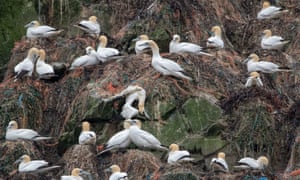While lockdown has allowed some a greater appreciation of spring and the fun of seeing goats, sheep and deer foraying into urban landscapes, Covid-19 is wreaking havoc with UK biodiversity as vital conservation projects are put on hold.
On Friday conservationists warned of “desperate times” with an explosion in invasive non-native species during prolific spring growth and the deterioration of rare and historic wildlife meadows that could take years to restore.
The potential loss of species, such as dormice, from some areas, was another threat due to stalled projects, said the Wildlife Trusts, which represents 46 UK nature charities caring for 2,300 reserves.
A combination of furloughed staff, depleted funds through the closure of visitor centres, and cancellation of fundraisers, and the difficulty of working amid social distancing guidelines, had profound implications for UK biodiversity, it said.
Invasive bracken control on reserves, including sites run by the Alderney Wildlife Trust in the Channel Islands, has stopped, causing deteriment to the Dartford warbler, slow worm, and plant life including heather, and pyramid, green-winged, and bee orchids. The bracken, which smothers competitors, has already started growing again, and would have been cut back this week.
Himalayan balsam is also a concern. The ecologically damaging flower can grow up to a height of three metres (10ft) in one spring and summer season. But annual “balsam bashing” events by staff and volunteers have been halted.
Five years of intensive work to clear brambles and scrub from two historic wildflower meadows at Cwm Colhuw nature reserve in Wales could now be undone. A spokesperson said: “If no management is continued on this site then very quickly, within 12 months, we will see scrub and brambles taking over once again and a decline of wildlife.”
Precious heathland in Surrey reserves cannot be grazed, due to social distancing and movement restrictions. Managed grazing by livestock can benefit heathland, creating a mosaic of differing habitats. Without that complexity various creatures will be put at risk, including birds such as the nightjar and woodlark, and reptiles including smooth snakes and sand lizards.

“Restoring nature in the UK – one of the most nature depleted countries in the world – has become harder than ever during the pandemic,” said the Wildlife Trusts. “At the same time, people are seeking solace in nature.”
Huge numbers of people are tuning in to the Wildlife Trusts’ webcams, which have been showing barn owl chicks hatching and puffins emerging from their burrows. But staff still working are having to contend with illegal activities such as fly-tipping, vandalism and wildlife shooting.
A dormice monitoring project in south-west Wales is threatened by a lack of funds. Rat control on islets off Alderney has been halted; staff reported seeing rats on camera traps eating the eggs of razorbills and guillemots.
A hedgehog GPS tagging project, to establish if hedgehogs are eating the eggs of ground-nesting birds, is threatened. Sea bird and marine mammal counts have been abandoned, as have butterfly and scarce plant monitoring.
More than 60% of the human population in Britain live within a three-mile walk of a Wildlife Trust nature reserve.
Urging people to support their local Wildlife Trust, Craig Bennett, the organisation’s CEO, said: “The work of the Wildlife Trusts is critical … at a time when there’s a big public conversation about the importance of nature, and access to it, in our everyday lives.
“The Wildlife Trusts can be a vital part of our nation’s recovery from the current health crisis. Nature brings health benefits and offers solutions to the other great emergency facing humanity – climate change – so it must be protected and allowed to recover.”